What was it like to be a traveling salesman, or musician, in the mid- to late-1920s? The answer: NOTHING like today.
Frank Auston Kennedy and Raymond Huston Kennedy, father and son, were, each of them, in 1928, working men out on the road. Frank and Raymond were my grandfather and father. In 1928 Frank was 52; Raymond was 21. Frank was a traveling tailor; his oldest son was a traveling musician. Frank traveled alone; Raymond traveled with a band.
Think of it — how did travelers in 1928 communicate with the folks back home? They had no internet. They had no cell phones. A telephone call back home was long distance, and was probably made from the hotel pay phone where you stopped for the night. Long distance telephone calls were considered a luxury for the working class — I get the impression that my dad and grandpa reserved those for emergencies. Instead, they purchased 2-cent stamps and mailed home beautifully handwritten notes (most likely using a fountain pen and homemade ink).
The mode of transportation in 1928, out past your hometown, was railroad for long trips, and bus for shorter ones. The family car was not yet the norm. And this was long before superhighways — small dirt roads were to be expected in most towns, and many side streets of larger towns. Get a better picture?
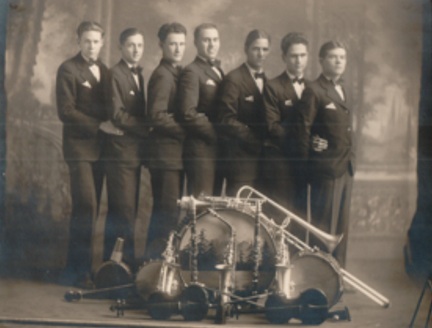 Now, imagine for a moment the thought of choosing a traveling career as “frivolous” as playing the trumpet and singing. Raymond, at the age of 21, was determined to make it big. In 1928, big bands were fast becoming the norm in popular music. Shellac 78 records of Paul Whiteman and Fred Waring were widely available for purchase. Dad (far left in the photo) assembled some fellow musicians and set out on a tour, of sorts, from Glasgow.
Now, imagine for a moment the thought of choosing a traveling career as “frivolous” as playing the trumpet and singing. Raymond, at the age of 21, was determined to make it big. In 1928, big bands were fast becoming the norm in popular music. Shellac 78 records of Paul Whiteman and Fred Waring were widely available for purchase. Dad (far left in the photo) assembled some fellow musicians and set out on a tour, of sorts, from Glasgow.
Throughout Raymond’s childhood Frank and Louise had managed a “Five-and-Dime” store in Glasgow. Within the store Frank offered a ‘made-to-order’ tailoring business. Grandma Louise was a milliner (she assembled ladies’ hats) and a piano teacher.
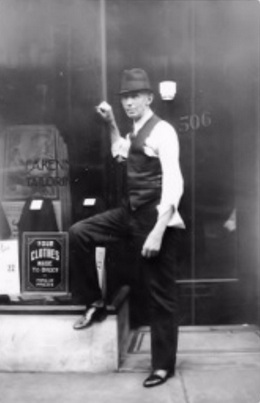 By the age of 52, after Raymond’s high school graduation, Frank felt the need to hit the road with his suit sales, perhaps leaving Louise back home to manage the store. But it was a hard life — he wrote letters back home to his beloved Louise about the dusty roads and expensive bus fares. He missed his wife and two sons — and sincerely hoped his older son Raymond remained safe and sound out on the road with his trumpet.
By the age of 52, after Raymond’s high school graduation, Frank felt the need to hit the road with his suit sales, perhaps leaving Louise back home to manage the store. But it was a hard life — he wrote letters back home to his beloved Louise about the dusty roads and expensive bus fares. He missed his wife and two sons — and sincerely hoped his older son Raymond remained safe and sound out on the road with his trumpet.
Louise was most likely furious when her son Raymond decided to take off, while Frank was struggling so hard to make ends meet. Her own brother, Jimmy, had left the Midwest in search of a music career, and against the odds became a successful drummer and band director in Los Angeles. No doubt Raymond was following in Uncle Jimmy’s footsteps, and Louise was worried her oldest son might slip into a lifestyle unbecoming to a young gentleman.
Raymond, however, soon found out from his own experience it was no easy task to make a living on the road. His first band, The Original Blue Moon Serenaders, worked in tiny towns throughout Kentucky as they dreamed of gaining a following and moving to a bigger place with more musical opportunity like Chicago, New York or Kansas City.
Although my dad refused to take on the store back in Glasgow in his younger years, in one sense he certainly followed that tradition. After 5-6 years on the road as a musician, band leader and radio announcer, he took a trip into Maplewood, MO.
Raymond must have liked what he saw — in 1934 he opened a music school. Later, with the help of his dad, mom and brother Tom, he opened Kennedy Music — a storefront located at Manchester and Oakview Terrace in Maplewood. From that point on, his traveling days were over.
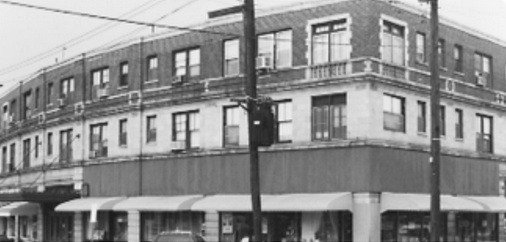 The Brownsom Hotel (corner of Manchester and Yale — the large building is still there) and the storefront currently occupied by Vom Fass (7314 Manchester), hosted Raymond Kennedy’s dance bands throughout the 1930s and early 1940s.
The Brownsom Hotel (corner of Manchester and Yale — the large building is still there) and the storefront currently occupied by Vom Fass (7314 Manchester), hosted Raymond Kennedy’s dance bands throughout the 1930s and early 1940s.
Maplewood, MO has a rich heritage of unique shops and entertainment.The Maplewood Chamber of Commerce welcomes you to share YOUR pictures and fun facts to a new Twitter hashtag “#MaplewoodMOThen&Now.” My book “Kennedy Music — An Historical Novel Based on the Kennedy Family Maplewood, MO” is available through The BookHouse in Maplewood.”
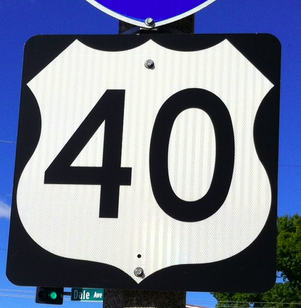
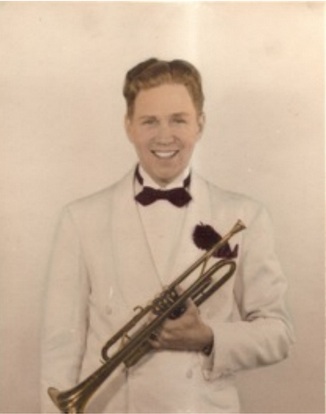
Do you still have copies of The Kennedy Book available at your store & what is the price & what are your hours
Is this the same Book House that was in Rock Hill ??
My Mom & her family grew up in Maplewood My Grandfather had a Heating
& Sheet Metal Shop on Manchester & lived on Burgess Ln ( Eveready Heating)
I remember Ray Kennedy playing with John Pizzarelli & was at his last Performance with Tom at the Bistro
Joan – The Book House has copies of Kennedy Music for $19.95 for signed copies. Yes – this is the same Book House that was in Rock Hill. They moved to Maplewood about a year and a half ago.